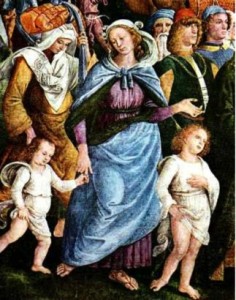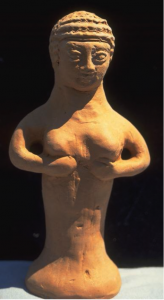Zipporah, Moses’ wife, was one of seven daughters of the priest of Midian, variously known as Jethro, Reuel and Hobab. After Moses received his directive from Yahweh to return to Egypt to save the Israelites, at a night encampment on the way, God threatened to kill either Moses or his son (the pronouns are unclear). Zipporah averted the imminent death by circumcising her son with a flint. Thereafter Zipporah returned with her sons to her father’s home in Midian. Later she rejoined Moses at Mt. Sinai. Nothing more is recorded of her. Our knowledge of Zipporah is limited to a few verses in the Bible. Most scholars have relegated the Zipporah account as too unfathomable and fragmentary to ever reconstruct into a cohesive narrative whole. However, I think there are sufficient details in these verses to enable us to identify the most plausible explanation of who she was and what she did.
Tag Archives: goddesses
El Shaddai: The God with Breasts
“And Jacob said to Joseph, “El Shaddai appeared to me at Luz in the land of Canaan, and He blessed me, and said to me, ‘I will make you fertile and numerous…’ And Shaddai who blesses you…blessings of the breast and womb.” Genesis 48:3-4; 49:25
“God also spoke to Moses and said to him: ‘I am the Lord. I appeared to Abraham, Isaac, and Jacob as El Shaddai, but I did not make Myself known to them by my name Yahweh.” Exodus 6:3
God of the Patriarchs and Matriarchs
Rooted in a very old poetic tradition, the divine name Shaddai occurs 48 times in the Hebrew Bible and has traditionally been translated as Almighty. The early Hebrew ancestors of Israel “worshipped the supreme god under various appellations, such as El (as among the North Canaanites of Ugarit), (El-) ‘Elyon, (El-) Saddai” (Albright, p.191). Perhaps the deity’s name is related to Shaddai, a late Bronze Age Amorite city on the banks of the Euphrates River (in what is now northern Syria). It has been surmised that Shaddai was the god worshipped in this area, an area associated with Abraham’s home. It is “quite reasonable to suppose that the ancestors of the Hebrew brought it [Shaddai] with them from northwestern Mesopotamia to Palestine” (Albright, p.193). The early patriarchs and matriarchs then would have perceived Shaddai as their chief god. Continue reading El Shaddai: The God with Breasts


